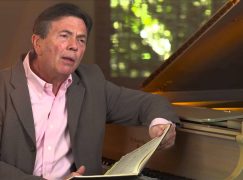Speaking Soundly: The principal trumpet who made it big
OrchestrasThis week’s guest on David Krauss’s podcast is the conductor Gerard Schwarz, who started out as co-principal trumpet of the New York Philharmonic orchestra. Schwarz, 76, went on to become transformational music director of the Seattle Symphony for 26 years, as well as leading New York’s Mostly Mozart Festival and, for five years, heading the Royal Liverpool Philharmonic Orchestra.
Schwarz talks about his parents, both doctors from Vienna, who took their kids to music as a matter of course. His mother never got over the murder of her parents in a Nazi transport to Latvia. ‘Whatever my sisters and I did,’ he says, ‘it was a better life than being killed by the Germans.’
Having achieved his dream of playing trumpet in the New York Philharmonic, ‘how could I think at the age of 28 that I could take something of my love and just put that aside and assume I would be a successful conductor? It was all stupidity.’
Listen here.






Comments